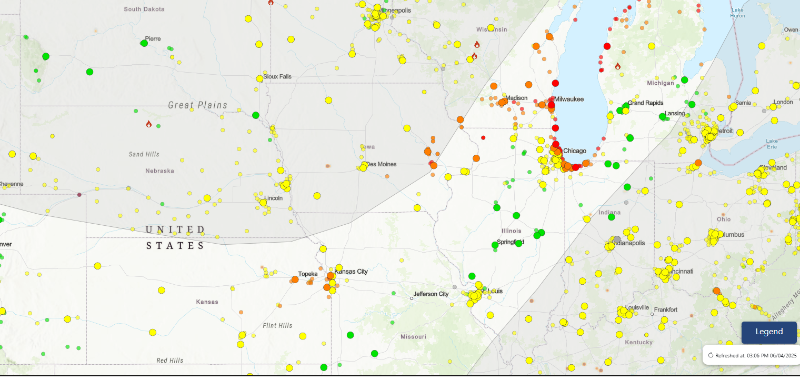Smoke Advisory & Air Quality Alert
June 04, 2025
WHAT...Air Quality Alert
WHERE...Central and Eastern Nebraska
WHEN...6/5/2025 6:00 AM until 06/6/2025 12:00 PM
POLLUTANT...PM 2.5 particulates
AIR QUALITY INDEX...Unhealthy for Sensitive Groups
ADDITIONAL DETAILS... An alert for possible Unhealthy for Sensitive Groups (Air Quality Index orange category) due to smoke has been issued for the following Nebraska counties: Adams, Antelope, Boone, Buffalo, Burt, Butler, Cass, Cedar, Clay, Colfax, Cuming, Dakota, Dawson, Dixon, Dodge, Douglas, Fillmore, Franklin, Furnas, Gage, Gosper, Greeley, Hall, Hamilton, Harlan, Howard, Jefferson, Johnson, Kearney, Knox, Lancaster, Madison, Merrick, Nance, Nemaha, Nuckolls, Otoe, Pawnee, Phelps, Pierce, Platte, Polk, Richardson, Saline, Sarpy, Saunders, Seward, Sherman, Stanton, Thayer, Thurston, Valley, Washington, Wayne, Webster, and York, from June 5, 6:00 am through June 6, 12:00 pm.
During Unhealthy for Sensitive Groups AQI (orange category) conditions, members of sensitive groups may experience health effects. Sensitive groups include people with heart or lung disease, older adults, children and teenagers, pregnant women, and outdoor workers. When conditions rise to the orange category, sensitive groups are advised to reduce prolonged or heavy exertion and avoid intense outdoor activities.
Smoke from Canadian wildfires may affect the air quality in Nebraska. Smoke levels and wind directions are monitored by Nebraska and other states to predict when impacts to the air quality may occur. Information regarding wildfires and Impacts in Nebraska is available from the Nebraska Department of Environment and Energy (NDEE) at https://dee.nebraska.gov/wildfires-and-impacts-nebraska
Alerts are based on data available from weather forecasts, smoke plume modeling, satellite imagery, and from air quality monitors located in Omaha, Bellevue, Blair, Lincoln, Beatrice, Grand Island, and Scottsbluff. Advisories for smoke and air quality are issued for affected areas by the Nebraska Department of Health and Human Services (DHHS) and Department of Environment and Energy (NDEE) and posted on agency webpages and social media sites. By notifying the media and local health departments, alerts help citizens protect their health by informing them of days where outdoor activities should be reduced or avoided to minimize exposure to smoke.


 Launch the media gallery 1 player
Launch the media gallery 1 player